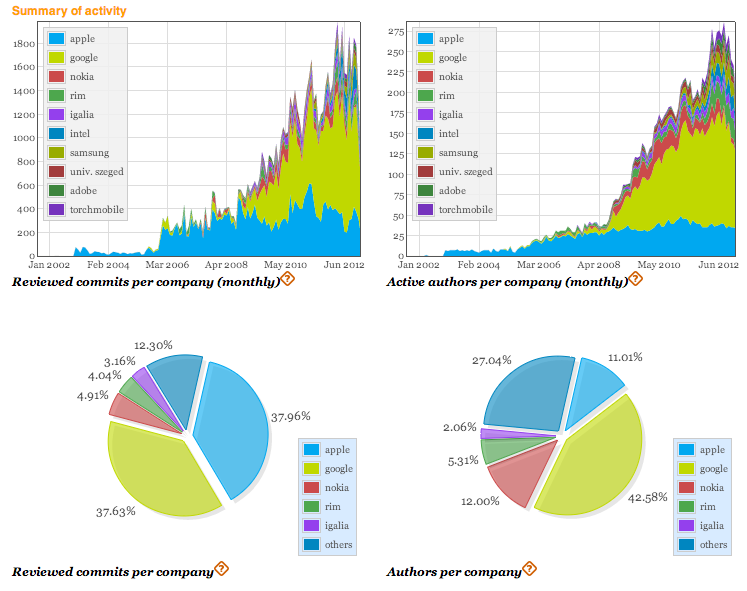Apple and Google still represent the bulk of reviewed commits contributing to the ongoing development of WebKit, the open source web browser engine that powers Safari and Chrome, among others. Google accounts for the bulk of commits, having overtaken Apple in that regard back in 2009 (though Apple still does much more with fewer authors actually writing code), but the more interesting story here is that the impact of other parties is steadily growing.
Bitergia, a company that analyzes free, libre and open-source software projects, gathered data on the development of WebKit in a new report, showing that the share of reviewed commits coming from parties other than Apple and Google is at 25 percent and growing, higher than it has been in the past. Around five companies were actively contributing to WebKit back in 2007, but that number has risen to over 20 today, and the picture of which of those companies is contributing the most tells a story about changing fortunes and goals for companies building products for the web.
 Nokia, for instance, was once a significant contributor to WebKit, with its contribution peaking around late 2011 (which is also when the Windows 7-powered Lumia line first appeared, and when MeeGo was still a going concern). Lately, however, Nokia’s contribution has dropped off dramatically, with both its monthly commits and authors working on WebKit taking a steep dive. That may show where Nokia’s priorities lie as it becomes more of a dedicated hardware partner running more or less on software provided by Microsoft.
Nokia, for instance, was once a significant contributor to WebKit, with its contribution peaking around late 2011 (which is also when the Windows 7-powered Lumia line first appeared, and when MeeGo was still a going concern). Lately, however, Nokia’s contribution has dropped off dramatically, with both its monthly commits and authors working on WebKit taking a steep dive. That may show where Nokia’s priorities lie as it becomes more of a dedicated hardware partner running more or less on software provided by Microsoft.
BlackBerry, in stark contrast, has increased its contributions and authors working on WebKit by almost inverse proportion to Nokia. It’s impact has grown steeply since 2011, which is in keeping with the development of BB OS 10 and its WebKit-based browser, an element of the OS the company placed a lot of emphasis on at launch.
Apple and Google are still the most invested in the development of WebKit, and for good reason, but the changing picture of reviewed commits helping the engine along means we’re seeing a more diverse set of interests represented in the project than ever before, and it’ll be interesting to see where that takes us.
